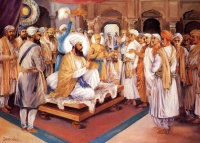Template:AOW10: Difference between revisions
Hari singh (talk | contribs) No edit summary |
Hari singh (talk | contribs) mNo edit summary |
||
| Line 3: | Line 3: | ||
[[Image:GuruTeghBahadurJi FreedomOfReligion2.jpg|thumb|200px|left|Guru Tegh Bahadar with the Kashmiri Pandits]] | [[Image:GuruTeghBahadurJi FreedomOfReligion2.jpg|thumb|200px|left|Guru Tegh Bahadar with the Kashmiri Pandits]] | ||
On '''November 24''', the [[Sikh]] remember the [[Martyrdom of Guru Tegh Bahadar]], their ninth Guru. An extremely important event in [[Sikh]] history that had a profound impact on the future direction of [[Sikhism]], the religion of the [[Sikh]]s. [[Guru Tegh Bahadar]] undertook the '''supreme sacrifice for the protection of the most fundamental of human rights''' - the right of a person to freely practice his or her religion without interference or hindrance. In the modern day we tend to take this freedom for granted – but in 1675, millions of people were denied this basic right. | On '''November 24''', the [[Sikh]]s remember the [[Martyrdom of Guru Tegh Bahadar]], their ninth Guru. An extremely important event in [[Sikh]] history that had a profound impact on the future direction of [[Sikhism]], the religion of the [[Sikh]]s. [[Guru Tegh Bahadar]] undertook the '''supreme sacrifice for the protection of the most fundamental of human rights''' - the right of a person to freely practice his or her religion without interference or hindrance. In the modern day we tend to take this freedom for granted – but in 1675, millions of people were denied this basic right. | ||
However, what is even more astonishing is the fact that the Guru was not protecting the right of the [[Sikh]]s to practise their religion but instead the rights of '''non-Sikh peace-loving people from Kashmir'''. These people from Kashmir were '''very respected [[Hindu]]s who were being converted to Islam under the threat of death''' by the "[[Muslim]]" Emperor, [[Aurangzeb]]. In 1669, the [[Mughal]] ruler Aurangzeb departed from the policy of tolerance practised by his predecessors and unleashed instead a policy of '''religious persecution against non-Muslims'''. {{Aowf|Martyrdom of Guru Tegh Bahadar}} | However, what is even more astonishing is the fact that the Guru was not protecting the right of the [[Sikh]]s to practise their religion but instead the rights of '''non-Sikh peace-loving people from Kashmir'''. These people from Kashmir were '''very respected [[Hindu]]s who were being converted to Islam under the threat of death''' by the "[[Muslim]]" Emperor, [[Aurangzeb]]. In 1669, the [[Mughal]] ruler Aurangzeb departed from the policy of tolerance practised by his predecessors and unleashed instead a policy of '''religious persecution against non-Muslims'''. {{Aowf|Martyrdom of Guru Tegh Bahadar}} | ||
Revision as of 22:04, 22 November 2008
On November 24, the Sikhs remember the Martyrdom of Guru Tegh Bahadar, their ninth Guru. An extremely important event in Sikh history that had a profound impact on the future direction of Sikhism, the religion of the Sikhs. Guru Tegh Bahadar undertook the supreme sacrifice for the protection of the most fundamental of human rights - the right of a person to freely practice his or her religion without interference or hindrance. In the modern day we tend to take this freedom for granted – but in 1675, millions of people were denied this basic right.
However, what is even more astonishing is the fact that the Guru was not protecting the right of the Sikhs to practise their religion but instead the rights of non-Sikh peace-loving people from Kashmir. These people from Kashmir were very respected Hindus who were being converted to Islam under the threat of death by the "Muslim" Emperor, Aurangzeb. In 1669, the Mughal ruler Aurangzeb departed from the policy of tolerance practised by his predecessors and unleashed instead a policy of religious persecution against non-Muslims. .....More

